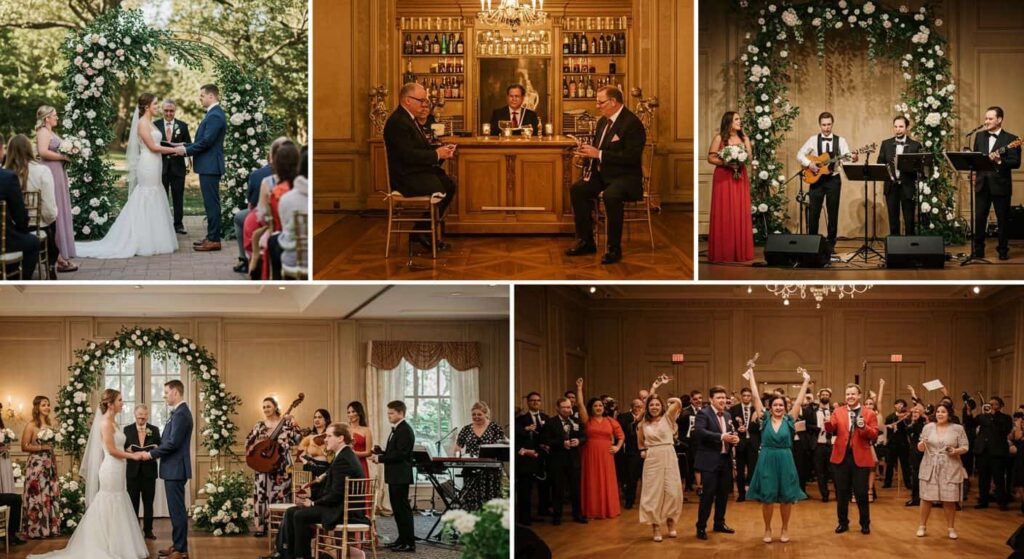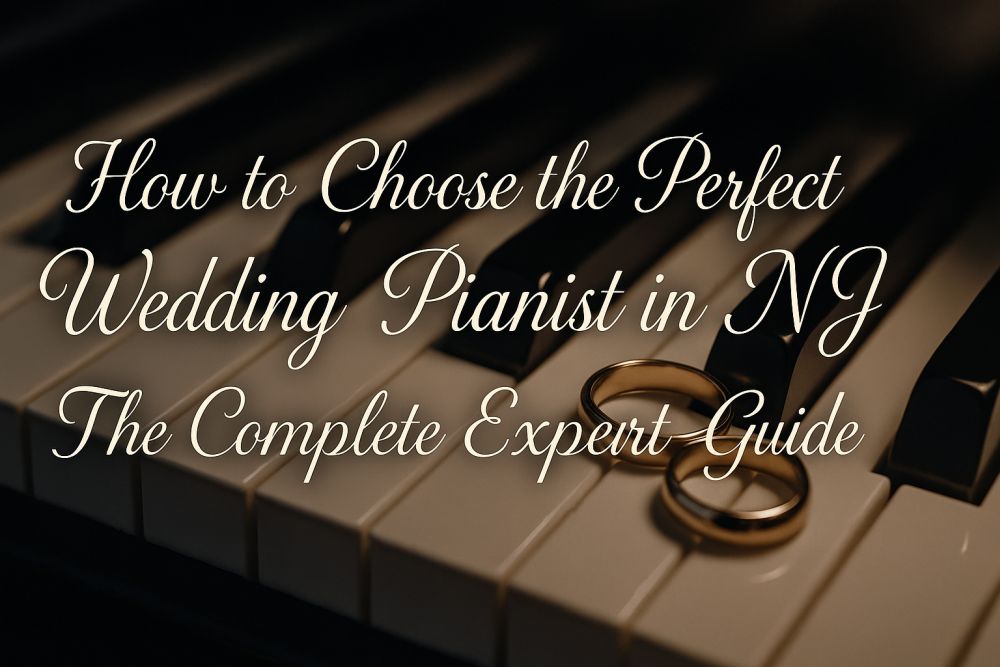The Complete Expert Guide for Choosing a Piano Player in New Jersey
With over 20 years of experience performing at weddings across New Jersey, NYC, and Philadelphia, Arnie Abrams shares his insider knowledge to help couples make the perfect choice for their special day.
Planning your wedding is one of life’s most exciting journeys, but choosing the right entertainment can feel overwhelming. As a professional pianist who has performed at hundreds of weddings throughout New Jersey, I’ve witnessed firsthand how the right musical choice can transform an ordinary ceremony into an extraordinary celebration that guests remember for years.
The difference between a good wedding and an unforgettable one often comes down to the atmosphere created by live music. After two decades in the wedding industry, I’ve learned that couples who ask the right questions and understand what to look for invariably make choices they’re thrilled with on their wedding day and beyond.
Understanding Your Musical Vision
Before you begin searching for musicians, you need to clearly define what you want your wedding to feel like. This foundational step will guide every decision that follows.
Creating Your Ideal Atmosphere

The atmosphere you choose sets the emotional tone for your entire celebration. Do you envision an elegant, romantic ambiance with soft classical melodies during your ceremony? Or perhaps you’re drawn to the sophisticated energy of jazz standards during your cocktail hour?
In my experience working with couples across New Jersey, North Jersey, Central Jersey, and South Jersey, I’ve found that the most successful weddings have a clear musical vision from the start. This doesn’t mean every detail needs to be planned, but having a general sense of style helps ensure consistency throughout your celebration.
Consider these atmosphere options:
- Romantic and intimate: Soft classical pieces, gentle contemporary ballads, and timeless love songs
- Elegant and sophisticated: Jazz standards, Broadway classics, and refined pop interpretations
- Fun and energetic: Upbeat contemporary hits, classic rock favorites, and interactive sing-alongs
- Traditional and formal: Classical ceremony music, traditional wedding marches, and timeless standards
Identifying Your Personal Musical Preferences
Your wedding should reflect your unique love story and personal tastes. Start by creating a list of songs that are meaningful to you as a couple. These might include:
- The song that was playing when you first met
- Your favorite artists or musical genres
- Songs that remind you of special moments in your relationship
- Pieces that simply make you happy when you hear them
Don’t worry if your list includes everything from Beethoven to Billy Joel – as an experienced wedding pianist, I can adapt virtually any song to create the perfect mood for each moment of your celebration.
Venue Considerations and Sound Requirements
Your venue plays a crucial role in determining the right musical approach. Different spaces have unique acoustic properties and logistical requirements that will influence your pianist selection.
Indoor venues typically offer controlled acoustics and reliable power sources, making them ideal for various musical styles. Churches often have beautiful natural acoustics that enhance classical and traditional pieces, while modern reception halls may benefit from contemporary arrangements and amplified sound.
Outdoor celebrations present unique opportunities and challenges. Jersey Shore weddings are particularly popular, and I’ve performed at dozens of beachfront ceremonies where the natural beauty provides a stunning backdrop for live music. However, outdoor events require careful planning for weather contingencies, power sources, and sound projection.
When considering your venue’s impact on music selection, think about:
- The size of your guest list and how sound will carry
- Available power sources and amplification needs
- Backup plans for weather-related challenges
- Any venue restrictions on music or equipment
- The overall aesthetic and how music will complement the space
The Research Process: Finding Quality Musicians
Once you’ve defined your musical vision, it’s time to find pianists who can bring that vision to life. This research phase is critical – the right approach will save you time and help you identify truly exceptional musicians.
Leveraging Personal Recommendations
Start your search by asking friends, family members, and recently married couples about their experiences. Personal recommendations are invaluable because they come from people who have actually witnessed the musician’s performance at a real wedding.
When gathering recommendations, ask specific questions:
- How did the musician handle unexpected requests or changes?
- Was the music volume appropriate for conversation during cocktail hour?
- Did the musician arrive on time and dress appropriately?
- Would they hire this person again for their own future events?
Wedding vendors in your network can also provide excellent recommendations. Wedding venues often work with the same musicians repeatedly and can tell you who consistently delivers exceptional service.
Professional Directories and Online Research
While personal recommendations are valuable, don’t limit yourself to them. Professional musicians maintain online presences that showcase their skills and experience. When reviewing potential pianists online, look for:
Professional websites that demonstrate their commitment to their craft. A well-maintained website with clear information about services, pricing, and availability suggests a serious professional. Pay attention to the quality of their music demos – these recordings should showcase both technical skill and musical sensitivity.
Client testimonials and reviews provide insight into the musician’s reliability and professionalism. Look for reviews that mention specific details about the performance, punctuality, and overall experience. Read testimonials that mention how the musician handled challenges or went above and beyond expectations.
Social media presence can reveal a musician’s personality and current activity level. Active musicians often share recent performances, which helps you gauge their current skill level and style.
Understanding Different Types of Wedding Musicians
Not all wedding pianists offer the same services. Understanding the different types of musicians available will help you make the right choice for your specific needs.
Solo pianists offer intimate, elegant entertainment perfect for ceremonies, cocktail hours, and smaller receptions. This option provides beautiful music while maintaining a budget-friendly approach.
Piano and vocal combinations add the warmth and emotion of live vocals to piano accompaniment. This setup is ideal for couples who want their favorite songs performed with lyrics during key moments.
Small ensembles might include jazz guitarists, violinists, or other instruments alongside piano. These combinations offer richer sound and greater musical variety.
Full bands with piano as a featured instrument provide the most comprehensive musical experience but require larger budgets and venues that can accommodate multiple musicians.
Experience and Repertoire: What Really Matters
When evaluating potential wedding pianists, experience and repertoire are the two most important factors that will determine the success of your musical entertainment.
Assessing Musical Versatility and Skill
A truly exceptional wedding pianist possesses both technical proficiency and the musical sensitivity to read the room and adjust accordingly. During my career, I’ve learned that versatility is key – you need someone who can seamlessly transition from a solemn ceremony piece to an upbeat cocktail hour jazz standard.
Look for musicians who demonstrate:
Classical training foundation: Even if you’re not planning a classical wedding, formal training provides the technical skills necessary to handle any musical challenge. My own classical training in New Haven and Buffalo has been invaluable in developing the precision and musical understanding that clients expect.
Jazz improvisation skills: The ability to improvise and adapt songs in real-time is crucial for wedding entertainment. This skill allows the musician to extend or shorten pieces as needed, accommodate special requests, and maintain energy levels throughout your event.
Contemporary music fluency: Modern couples often want current hits incorporated into their celebration. A skilled pianist should be able to arrange contemporary songs in styles appropriate for your event, whether that means a romantic ballad version of a pop hit or an upbeat jazz interpretation of a modern favorite.
Evaluating Repertoire Depth and Breadth
The depth of a pianist’s repertoire directly impacts their ability to create the perfect atmosphere for every moment of your wedding. When discussing repertoire with potential musicians, consider:
Ceremony music options: Traditional wedding marches, classical pieces, and contemporary love songs should all be within their comfort zone. Ask about their experience with wedding ceremony music and whether they can accommodate special requests or cultural traditions.
Cocktail hour selections: This portion of your celebration requires music that encourages conversation while maintaining elegance. Jazz standards, light classical pieces, and sophisticated pop arrangements work well during this time.
Reception adaptability: As the evening progresses, the musical energy should evolve with your celebration. A skilled pianist can adjust their repertoire to match the changing atmosphere, from dinner music to dance-friendly arrangements.
Special request capability: The best wedding musicians can learn new songs or adapt existing pieces to meet your specific needs. When I work with couples, I always offer to learn special songs that are meaningful to them, even if they’re not currently in my repertoire.
Understanding Professional Experience Levels
Not all experience is created equal. When evaluating a pianist’s background, consider:
Wedding-specific experience: Performing at weddings requires different skills than restaurant gigs or concert performances. Wedding musicians must handle logistics, timing changes, and emotional moments while maintaining musical excellence.
Venue familiarity: Musicians who have performed at various types of venues understand how to adapt their performance to different spaces and acoustics. My experience performing everywhere from intimate restaurant settings to large corporate events has taught me how to adjust my approach for optimal sound in any environment.
Crisis management skills: Experienced wedding musicians know how to handle unexpected situations gracefully. Whether it’s equipment malfunctions, schedule changes, or last-minute requests, seasoned professionals maintain composure and find solutions quickly.
The Consultation Process: Making Your Final Decision
The consultation phase is where you’ll determine whether a particular musician is the right fit for your wedding. This conversation should cover both practical details and give you a sense of the musician’s personality and professionalism.
Preparing for Meaningful Conversations
Before scheduling consultations, prepare a comprehensive list of questions and requirements. This preparation ensures you gather all necessary information and can make informed comparisons between different musicians.
Essential questions to ask:
- What is your experience level with weddings similar to ours?
- Can you provide references from recent wedding clients?
- What is included in your standard wedding package?
- How do you handle special song requests or changes to the timeline?
- What backup plans do you have for equipment issues or emergencies?
- Can you accommodate our specific venue’s requirements and restrictions?
Information to share:
- Your wedding date, venue, and approximate guest count
- Preferred musical styles and any specific song requests
- Timeline for different portions of your celebration
- Budget parameters and any package preferences
- Special considerations or cultural traditions you’d like incorporated
Evaluating Communication and Professionalism
The consultation process reveals as much about a musician’s professionalism as their musical abilities. Pay attention to:
Response time and communication style: Professional musicians respond promptly to inquiries and communicate clearly about availability, pricing, and services. During my consultations with couples, I always provide detailed information and answer questions thoroughly because I understand how important these decisions are.
Flexibility and accommodation: The best wedding musicians work with you to create your ideal celebration rather than insisting on rigid packages or limitations. Look for someone willing to learn new songs, adjust timing, or work with your other vendors.
Problem-solving approach: Discuss potential challenges specific to your wedding and listen to how the musician addresses them. Experienced professionals offer practical solutions and backup plans rather than dismissing concerns.
Live Auditions and Demonstrations
While recordings and testimonials provide valuable information, nothing replaces hearing a musician perform live. Many professional pianists offer brief auditions or can direct you to upcoming public performances where you can experience their skills firsthand.
If a formal audition isn’t possible, ask for recent video recordings of actual wedding performances rather than studio recordings. These videos show how the musician handles real wedding environments and interactions with guests.
Essential Logistical Considerations
Beyond musical talent, successful wedding entertainment requires careful attention to practical details that ensure everything runs smoothly on your wedding day.
Equipment and Technical Requirements
Professional wedding pianists should have experience with various technical setups and come prepared for different venue scenarios.
Acoustic pianos vs. digital keyboards: Some venues provide acoustic pianos, which offer the most authentic sound and visual appeal. However, many locations require digital keyboards, which offer advantages like volume control, various instrument sounds, and weather resistance for outdoor events.
Sound amplification needs: Even acoustic pianos may require amplification for larger gatherings or outdoor ceremonies. Professional musicians should understand when amplification is necessary and have appropriate equipment or vendor relationships to ensure optimal sound quality.
Power and setup requirements: Discuss power needs, setup time, and any special requirements with your venue. Professional musicians arrive early to test equipment and make adjustments before guests arrive.
Timing and Schedule Coordination
Wedding day timing can be complex, and your musician needs to understand their role in the overall schedule.
Ceremony timing: Discuss prelude music duration, processional and recessional selections, and any special music during the ceremony itself. Experienced wedding musicians understand the importance of timing and can adjust their performance to match the pace of your ceremony.
Cocktail hour coordination: This period often involves the most complex logistics, as it typically occurs while you’re taking photos and guests are socializing. Your pianist should understand how to maintain appropriate energy levels and volume for conversation.
Reception transitions: If your musician is providing entertainment beyond the ceremony and cocktail hour, discuss how they’ll coordinate with other vendors like caterers, photographers, and wedding coordinators.
Weather and Contingency Planning
Outdoor weddings require additional planning for weather-related challenges.
Equipment protection: Professional musicians have protocols for protecting instruments and sound equipment from weather threats. This includes backup plans for sudden weather changes and appropriate coverings for equipment.
Indoor backup locations: Discuss how music plans will adapt if your outdoor ceremony moves indoors. The musician should be flexible enough to adjust their setup and repertoire as needed.
Communication protocols: Establish clear communication channels for day-of decisions about weather-related changes. Your musician should be easily reachable and able to adapt quickly to modified plans.
Special Considerations for NJ Weddings
New Jersey’s diverse wedding landscape presents unique opportunities and considerations that couples should understand when selecting their wedding pianist.
Regional Venue Types and Their Requirements
New Jersey offers an incredible variety of wedding venues, each with distinct characteristics that influence musical choices.
Historic venues throughout the state often feature beautiful architecture and natural acoustics that complement classical and traditional music selections. These locations may have restrictions on amplified sound or specific setup requirements.
Beach and waterfront locations along the Jersey Shore provide stunning backdrops but require musicians experienced with outdoor performance challenges. Salt air, wind, and sand can affect equipment, so choose pianists with specific outdoor wedding experience.
Modern reception halls offer controlled environments with flexible setup options, making them ideal for various musical styles and larger ensembles.
Private estates and garden venues combine the beauty of outdoor settings with some weather protection, but may have unique power and access considerations.
Cultural Diversity and Musical Traditions
New Jersey’s rich cultural diversity means wedding musicians must be prepared to incorporate various musical traditions and styles.
Multicultural celebrations often blend different musical traditions throughout the ceremony and reception. Experienced wedding pianists should be comfortable with various cultural musical styles and willing to learn specific pieces important to your heritage.
Religious ceremony requirements: Different faiths have specific musical traditions and restrictions. Professional wedding musicians understand these requirements and can work with religious officiants to ensure appropriate selections.
Family tradition incorporation: Many families have specific songs or musical traditions they want included in the celebration. The right pianist will work with you to seamlessly incorporate these elements into your overall musical plan.
Seasonal Considerations
New Jersey’s four distinct seasons each present unique opportunities and challenges for wedding music.
Spring and summer celebrations often feature outdoor ceremonies and receptions, requiring musicians comfortable with weather variables and outdoor acoustics.
Fall weddings may incorporate seasonal themes and holiday party elements, especially for late autumn celebrations.
Winter ceremonies might include holiday music elements or require indoor backup plans for originally outdoor events.
Red Flags to Avoid
After two decades in the wedding industry, I’ve observed patterns that distinguish exceptional wedding musicians from those who may disappoint on your special day. Recognizing these warning signs early can save you from costly mistakes.
Communication and Professionalism Warning Signs
Delayed or unprofessional communication: Musicians who take days to respond to initial inquiries or provide vague, unprofessional responses often lack the organizational skills necessary for successful wedding entertainment.
Reluctance to provide references: Any professional wedding musician should be proud to share recent client references. Hesitation to provide contact information for past clients is a significant red flag.
Inflexible package offerings: While having standard packages is normal, musicians who refuse to customize their services to meet your specific needs may not provide the personalized experience you deserve.
Unclear contracts or pricing: Professional musicians provide detailed contracts that clearly outline services, timing, pricing, and responsibilities. Avoid anyone who operates without proper documentation.
Musical and Performance Red Flags
Limited repertoire or unwillingness to learn new songs: Wedding entertainment requires flexibility and adaptation. Musicians who insist they can only perform specific songs or refuse to learn meaningful pieces for your celebration lack the commitment you deserve.
Poor quality recordings or reluctance to demonstrate skills: Professional musicians are proud of their abilities and should readily provide high-quality recordings or live demonstrations of their skills.
Lack of wedding-specific experience: While talented musicians exist in many genres, wedding entertainment requires specific skills and experience that differ from concert or restaurant performance.
Business Practice Warning Signs
Requests for full payment upfront: While deposits are standard, requests for complete payment well in advance of your wedding date are unusual and risky.
No backup plan for emergencies: Professional wedding musicians have contingency plans for illness, equipment failure, or other emergencies that could affect their ability to perform.
Negative online reviews or complaints: While occasional negative reviews are normal for any business, patterns of complaints about reliability, professionalism, or musical quality should be concerning.
Investment and Value: Understanding Pricing
Wedding music is an investment in creating lasting memories, and understanding how pricing works helps you make informed decisions that fit your budget while ensuring quality entertainment.
Factors That Influence Wedding Music Pricing
Experience and reputation: Established wedding musicians with proven track records typically command higher rates than newcomers to the industry. This premium reflects their reliability, musical skill, and ability to handle unexpected situations professionally.
Performance duration and complexity: Wedding ceremony music alone requires less time and preparation than full-day entertainment covering ceremony, cocktail hour, and reception. Longer performances and multiple venue locations naturally increase costs.
Ensemble size and instrumentation: Solo piano performance costs less than duos or larger ensembles, but the additional musicians provide richer sound and greater musical variety. Consider your venue size and musical preferences when deciding on ensemble size.
Geographic location and travel requirements: Musicians may charge travel fees for venues outside their primary service area. However, this shouldn’t prevent you from hiring the right musician – the difference between exceptional and mediocre entertainment far outweighs modest travel costs.
Seasonal demand and date flexibility: Peak wedding season (May through October) and popular dates (Saturdays) command premium pricing due to high demand. Couples with flexible timing may find better rates for off-peak dates.
Understanding Value Beyond Price
The cheapest option rarely provides the best value for wedding entertainment. Consider these factors when evaluating the true value of wedding music services:
Reliability and professionalism: Experienced wedding musicians arrive prepared, handle unexpected situations gracefully, and work seamlessly with your other vendors. This reliability is invaluable on your wedding day.
Musical quality and versatility: Skilled musicians create the perfect atmosphere for each moment of your celebration, adapting their performance to match the energy and emotion of different portions of your event.
Stress reduction and peace of mind: Professional wedding musicians handle their responsibilities independently, allowing you to focus on enjoying your celebration rather than worrying about entertainment logistics.
Guest experience enhancement: Quality live music creates memorable experiences that guests discuss long after your wedding. This lasting impact represents significant value that recorded music cannot match.
Budgeting Strategies for Wedding Music
Prioritize based on importance: If live wedding music is particularly important to you, allocate a larger portion of your budget to entertainment and find savings in other areas.
Consider package deals: Many wedding musicians offer packages that include ceremony, cocktail hour, and reception music at discounted rates compared to booking these services separately.
Explore ensemble options: If budget is a primary concern, solo piano provides elegant entertainment at lower cost than larger ensembles, while still offering the benefits of live music.
Plan for additional costs: Factor in potential travel fees, equipment rentals, or special song arrangements when budgeting for wedding music services.
Making Your Final Decision
After conducting thorough research and consultations, you’ll need to make your final selection. This decision should balance musical quality, professionalism, and value while ensuring the musician understands and shares your vision for your wedding day.
Comparing Your Options Objectively
Create a simple comparison system that helps you evaluate different musicians fairly:
Musical compatibility: How well does each musician’s style and repertoire match your vision? Can they accommodate your special requests and adapt to your venue’s requirements?
Professional presentation: Consider communication quality, contract clarity, and overall professionalism. These factors often predict how smoothly your wedding day entertainment will proceed.
Value proposition: Compare not just pricing, but the overall value each musician provides. Sometimes paying slightly more for significantly better service and peace of mind represents excellent value.
Personal connection: You should feel comfortable with your chosen musician and confident in their ability to contribute positively to your celebration.
Trusting Your Instincts
After gathering all the objective information, trust your instincts about which musician feels right for your wedding. The best choice combines professional competence with personal compatibility.
Your wedding entertainment should reflect your personality and create the atmosphere you’ve dreamed of. Choose the musician who demonstrates both the technical skills and personal understanding necessary to bring your vision to life.
Securing Your Date
Once you’ve made your decision, secure your wedding date quickly with a signed contract and deposit. Popular wedding musicians book well in advance, especially for peak season dates.
Review your contract carefully to ensure all details are clearly documented, including:
- Performance date, times, and locations
- Specific services included in your package
- Equipment and setup responsibilities
- Payment schedule and cancellation policies
- Backup plans for emergencies or weather issues
Conclusion: Creating Your Perfect Wedding Soundtrack
Choosing the perfect wedding pianist is one of the most important decisions you’ll make in planning your celebration. The right musician doesn’t just provide background music – they create the emotional soundtrack to one of the most important days of your life.
Throughout my career performing at weddings across New Jersey, New York City, and Philadelphia, I’ve witnessed how the right musical choices transform ordinary moments into extraordinary memories. From the anticipation as processional music begins to the joy of celebration during cocktail hour, live music provides an emotional depth that recorded music simply cannot match.
The seven essential questions outlined in this guide provide a framework for making an informed decision, but remember that choosing wedding entertainment is ultimately about finding someone who understands your vision and possesses the skills to bring it to life.
Your wedding deserves music that reflects your unique love story and creates lasting memories for you and your guests. Take the time to find a musician who shares your commitment to making your wedding day truly special.
Frequently Asked Questions
How far in advance should I book my wedding pianist?
I recommend booking your wedding pianist 9-12 months in advance, especially for popular dates during peak wedding season. Exceptional musicians often book solid for the most sought-after dates, so early planning ensures you have the best selection of available talent.
Can a wedding pianist perform for both ceremony and reception?
Absolutely! Many couples choose to have the same musician provide entertainment throughout their celebration for consistency and value. This approach ensures seamless transitions between different portions of your event and often provides cost savings compared to hiring multiple entertainers.
What if my venue doesn’t have a piano?
Professional wedding pianists typically provide their own digital piano keyboards for venues without acoustic pianos. Modern digital instruments offer excellent sound quality and can replicate various instrument sounds beyond piano, providing additional versatility for your celebration.
How do you handle song requests from guests?
Experienced wedding entertainers can often accommodate reasonable requests from guests, especially if they’re given advance notice of favorite songs. During the consultation process, discuss how special requests will be handled and whether there are any limitations based on your event timeline.
What backup plans exist if the musician becomes ill?
Professional wedding musicians maintain networks of qualified substitutes who can step in during emergencies. When booking your musician, discuss their backup plans and ensure these contingencies are documented in your contract for peace of mind.
Ready to begin planning the perfect musical experience for your wedding? Contact Arnie Abrams today for a free consultation to discuss your wedding music needs. With over 20 years of experience creating magical moments for couples throughout New Jersey, NYC, and Philadelphia, I’m here to help make your wedding dreams a reality.





